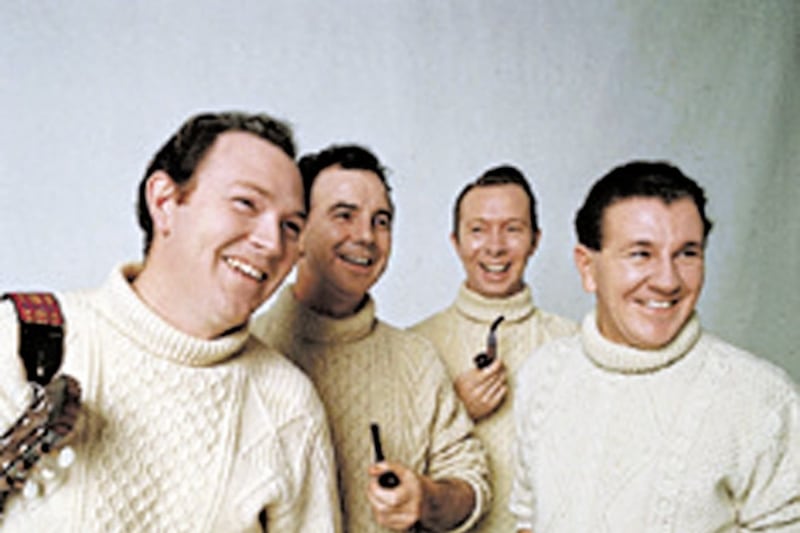FROM a Jacobite rebel song, to an ancient Scottish drinking tune and a 1980s pop track, the Irish public are being invited to pick `The Nation's Favourite Folk Song'.
Following an appeal by RTÉ for music lovers to nominate best-loved folk songs and their reasons why, a landmark TV series starting tomorrow will celebrate the central role the genre "has played, and continues to play, in Irish life, and to find out which song you feel best captures the essence of folk music in Ireland".
Thousands of people in Ireland and abroad nominated nearly 1,500 songs, and last month a jury distilled a shortlist of 10 classic folk songs that "illustrate how song has captured our collective experiences as people throughout the centuries".
The final choice will be made via the Sunday night RTÉ One show presented by folk legend Mary Black and featuring a host of stars past and present of the Irish folk scene.
The broadcaster has also commissioned 10 new interpretations of the songs, which will feature across RTÉ Radio One throughout the six weeks of the campaign.
Each Sunday night at 7.30pm well-known faces will champion their favourite and delve into the social history behind each song.
"Many of these songs have shaped and defined my life," said Mary Black. "So I’m excited to be part of a conversation that celebrates our rich folk-song heritage."
She added: "It's very hard to pin it down to just one song but it'll be interesting to see what happens... It's very personal, your own favourite is usually something that has some meaning to you - narrowing it down from nearly 1,500 nominations to 10 songs was a very very difficult thing to do’.
Voting went live yesterday afternoon and closes on May 21.
Ireland's Favourite Folk Song will be announced live on The Late Late Show on RTÉ One on May 31.
For further information and voting see www.rte.ie/culture/folk-song/2019/0425/1045599-vote-for-irelands-favourite-folk-song/.
:::::::::
THE TOP 10
A Rainy Night in Soho
The Pogues track was first released in 1986 and originally included on their `Poguetry in Motion EP', produced by Elvis Costello. It is regarded as one of MacGowan's finest compositions and has been covered by many artists, with U2 appearing on stage to the song every night on their 2017 Joshua Tree tour.
(Only) A Woman's Heart
Written by Irish singer/songwriter Eleanor McEvoy it was the title track of her 1992 album - the highest selling record in the country's chart history with 12 tracks performed by McEvoy, Mary Black, Dolores Keane, Sharon Shannon, Frances Black, and Maura O'Connell.
Danny Boy
The ballad, set to an ancient Irish melody (Londonderry Air), was written by in 1920 English songwriter Frederic Weatherly in the English town of Bath. It is most closely associated with the Irish diaspora.
Óró, Sé do Bheatha 'Bhaile
The traditional Irish song (roughly translated as `Yay, Welcome Home'), came to be known as a rebel song in the early 20th century. The song used to be played at the `Hauling Home', or the bringing home of a wife. It has also been associated with the Jacobite cause as the traditional version mentions Séarlas Óg (Young Charles), referring to Bonnie Prince Charlie and dating the song to 1745-6.
On Raglan Road
From a poem written by Co Monaghan writer Patrick Kavanagh, named after Raglan Road in Ballsbridge, Dublin, it recalls a love affair. After a meeting with Luke Kelly of The Dubliners it was set to the music of the traditional song Fáinne Geal an Lae.
Rocky Road to Dublin
The 19th-century Irish song about a man's experiences as he travels to Liverpool in England from his home in Tuam, the words were written by DK Gavan, `The Galway Poet', for the English music hall performer Harry Clifton who popularised the song.
The Foggy Dew
The latest incarnation of the song chronicles the Easter Rising of 1916, and encourages Irishmen to fight for the cause of Ireland, rather than for the British Empire, as so many young men were doing in World War I. An earlier version was written by Canon Charles O'Neill from Portglenone, parish priest of Kilcoo and later Newcastle, Co Down and former curate at St Peter's Cathedral, Belfast to music from a manuscript citing Carl Hardebeck as the arranger.
The Green Fields of France (Willie McBride)
Singer-songwriter Eric Bogle said he wrote The Green Fields of France as a response to the anti-Irish sentiment in Britain during the the 1970s IRA bombing campaign, choosing the name Willie McBride for the 19-year-old in the song because of its "Irish connotations".
The Parting Glass
A Scottish traditional song, often sung at the end of a gathering of friends, it was purportedly the most popular parting song sung in Scotland before Robert Burns wrote Auld Lang Syne. It was introduced to mid-20th century audiences by the recordings and performances of The Clancy Brothers and Tommy Makem.
The Town I Loved So Well
Written by Phil Coulter about his childhood in Derry, the first three verses are about his simple childhood, while the final two deal with the Troubles, and lament how his placid hometown had become a major military outpost, plagued with violence.



